Extraction of Respiratory Rate from Pulse Oximeter Recordings
An algorithm that uses pulse oximeter signals to estimate a respiratory rate with more accurate results and time-frequency resolution
Pulse oximeters are simple, non-invasive instruments used extensively in hospitals and emergency rooms to acquire patient oxygen saturation and cardiac functions. To maximize the potential of pulse oximetry, researchers have explored additional measurements, including respiratory rates. Today, respiratory rates can only be determined with costly equipment and additional sensors that patients often find uncomfortable, which further limits its use as a diagnostic tool.
Researchers in the Department of Biomedical Engineering at Stony Brook University have developed a new method that uses the pulse oximeter signal to estimate a respiratory rate. They have developed an algorithm called ?variable frequency complex demodulation? (VFCD) to identify frequency modulations of the photoplethysmogram waveform. The algorithm is based on the highest possible time and frequency resolution method for estimating time-frequency resolution method for estimating time-frequency spectra (TFS) and associated amplitudes. VFCD provides the best time and frequency resolution and most accurate amplitude estimates compared to other time frequency-based methods for tracking respiratory rate.
 Please note, header image is purely illustrative. Source: wideshuts, stock.adobe.com/uk/334138696, stock.adobe.com
Please note, header image is purely illustrative. Source: wideshuts, stock.adobe.com/uk/334138696, stock.adobe.com
Detects modulations in AM or FM signals, most accurate and repeatable results when compared to AR, CWT-FM and CWT-AM methods.
Biomedical Engineering.
8,858,450 & 8,388,543
Available for license.
Licensing
Additional Information:
Patent Information:
| App Type |
Country |
Serial No. |
Patent No. |
Patent Status |
File Date |
Issued Date |
Expire Date |
|